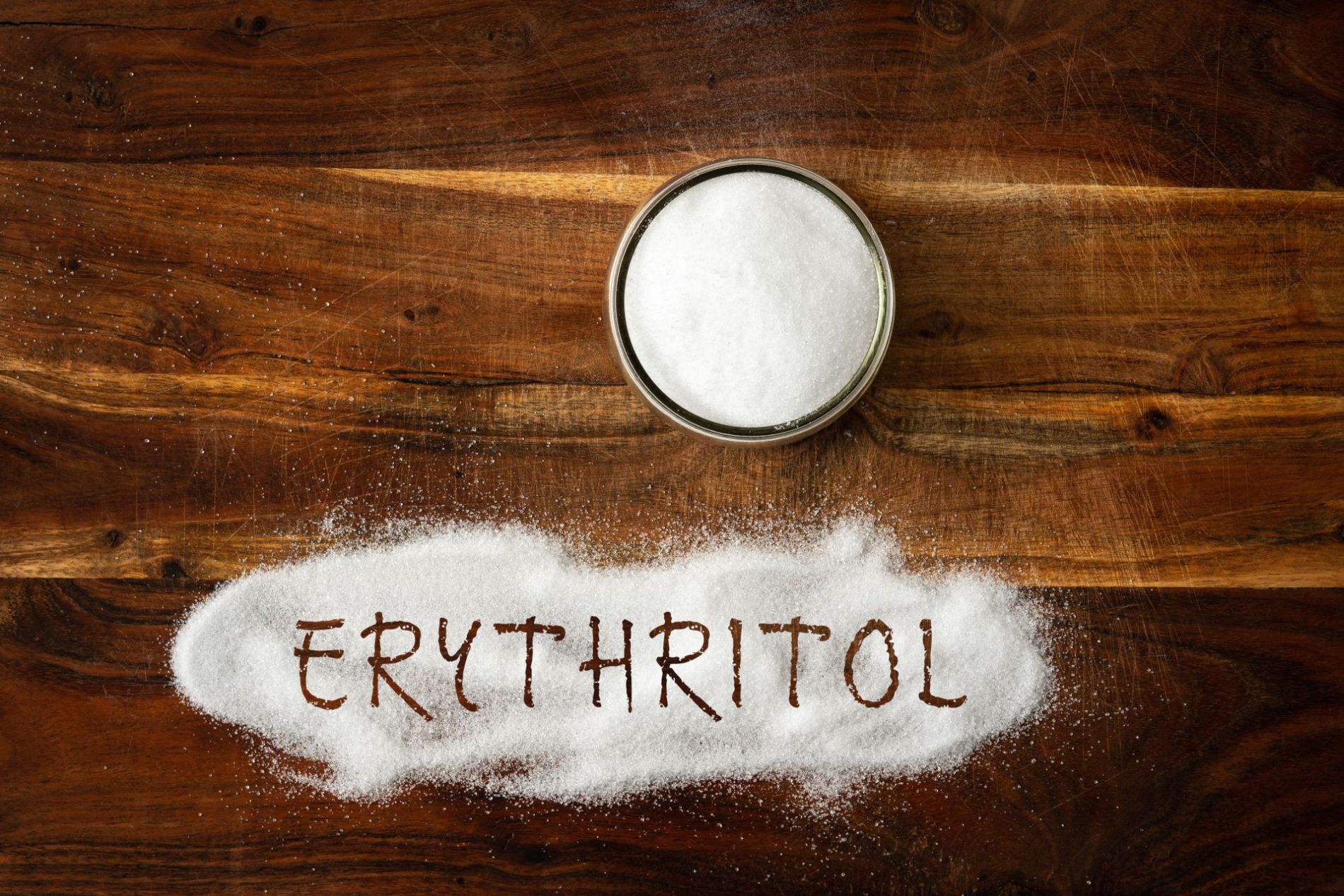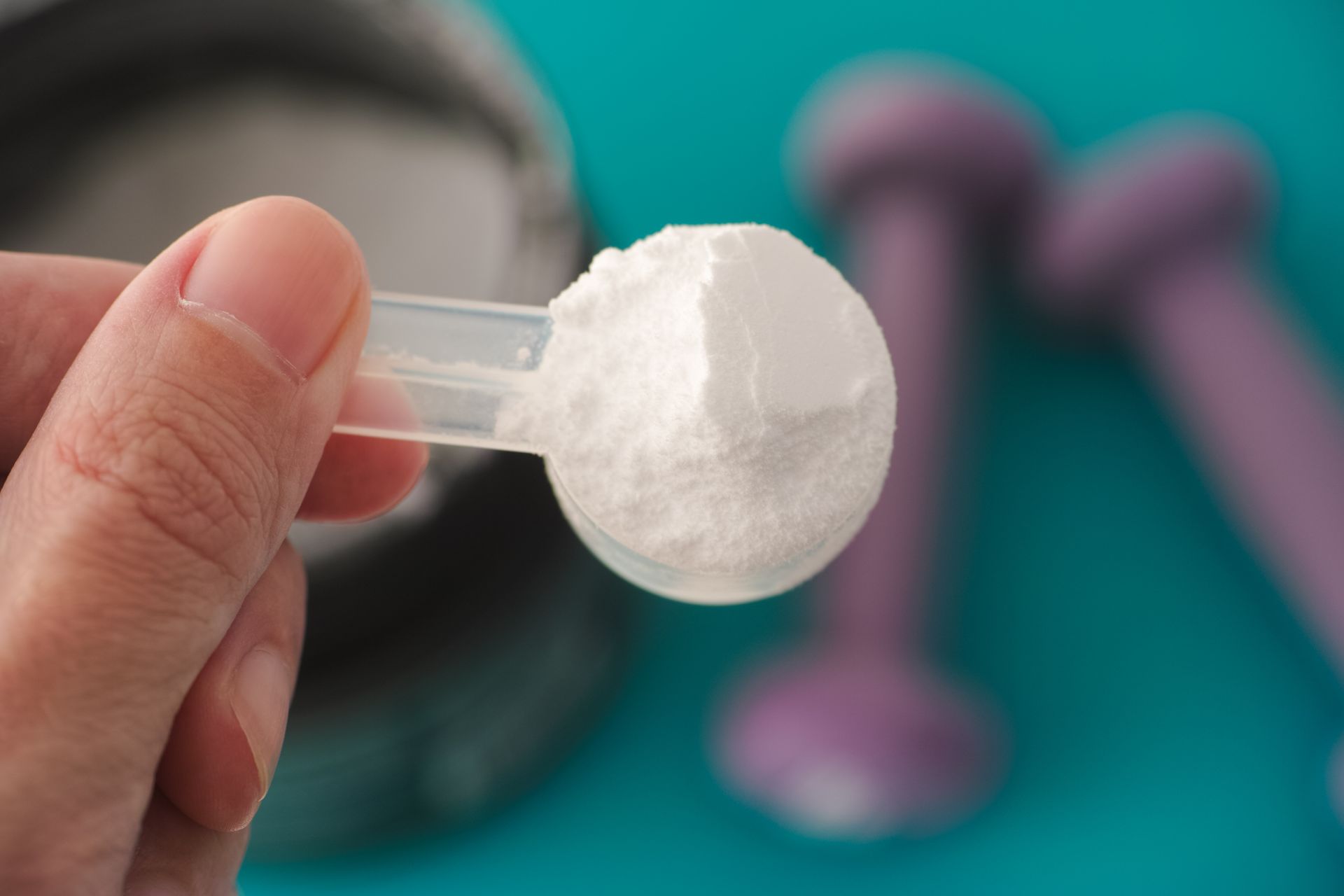Is erythritol the best sweetener?

Erythritol is a sweetener that falls into the polyol group of polyols, or polyols (aka sugar alcohols). Erythritol is approved for use as a food additive under the designation E968. Many people who care about their health and figure believe that erythritol is the best sweetener. Let's check whether this is indeed the case.
- Erythritol - what is it?
- Erythritol - how many calories does it have?
- Erythritol - health-promoting properties
- Erythritol - uses
- Erythritol - is it safe for health?
Erythritol - what is it?
Erythritol used as a sweetener is in the form of a white, crystalline and odorless powder that dissolves easily in water. Erythritol can be extracted on an industrial scale from corn and wheat starch by enzymatic hydrolysis and fermentation involving various yeast species, including Trigonopsis variabilis, Aurobasidium sp., Torula sp., Moniliela sp., Yarrowia lipolytica, Pseudozyma tsubakaensis and Candida magnoliae. In addition, erythritol naturally occurs in small amounts in mushrooms and some fruits and fermented products**. **Erythritol is contained in such products as peach, pear, watermelon, melon, grapes, mushrooms, cream cheese, beer, wine, sake (rice wine) and soy sauce.
Erythritol - how many calories does it have?
Erythritol is an excellent sweetener for anyone looking to lose weight and maintain a healthy body weight in the long term, as it provides trace amounts of calories. 1 g of erythritol contains only 0.2 kcal, while 5 g of erythritol (i.e. one flat teaspoon) provides only 1 kcal. This means that erythritol is 20 times less caloric than traditional table sugar (1 g = 4 kcal, 5 g - flat teaspoon = 20 kcal). Due to its marginal calorie content, erythritol can be safely used by overweight and obese people who are concerned about reducing excess body weight. Erythritol is one of the best and most commonly recommended sweeteners that can be used regularly while following a reduction diet.
Erythritol - health-promoting properties
Erythritol as a sweetener can be safely used by patients with diabetes and insulin resistance, as it has a very low glycemic index and charge. This means that regular inclusion of erythritol in the diet does not contribute to a significant increase in blood glucose (sugar) and insulin levels. Erythritol slows gastric emptying and glucose absorption from the small intestine. It has been proven that erythritol used by diabetic patients at 20 grams (4 teaspoons) daily for two weeks contributed to a significant decrease in glycated hemoglobin (HbA1c) from 8.5 to 7.5%.
It is a great sweetener that does not cause tooth decay, as it does not ferment in the mouth and therefore cannot be converted to acids by oral bacteria. Erythritol has even been shown to inhibit the development of tooth decay and may be more effective at doing so compared to other sugar alcohols such as xylitol and sorbitol. The use of erythritol as a sweetener may reduce plaque accumulation and inhibit the growth of pathogenic bacteria, such as: Streptococcus mutans, Streptococcus salivarius, Streptococcus sobrinus and Streptococcus sanguinis. A study showed that regular erythritol users had a lower count of the cariogenic bacteria Streptoccocus mutans in their saliva, which is responsible for the development of tooth decay. Erythritol consumption has well-documented beneficial effects on oral health in both children and adults.
There are also indications that erythritol may reduce circulating concentrations of the hunger hormone ghrelin and enhance postprandial satiety, which is attributed to erythritol's high osmolality compared to sucrose and other non-nutritive sweeteners. In addition, it is indicated that erythritol may have a beneficial effect on vascular endothelial function in patients with type 2 diabetes.

Erythritol - uses
Erythritol is a heat-resistant sweetener, so it can be successfully used in cooking and baking, including cakes, omelets, pancakes, dumplings, quiches and puddings. Most often, however, erythritol is used at home as a healthy sweetener to replace traditional table sugar in coffee, tea, fruit preparations, smoothies, baked goods and desserts. And in the food industry, erythritol (labeled E968 on the package) is mainly used by food manufacturers as a sweetener in low-calorie foods or products with reduced simple sugars (including: ice cream, cocoa and chocolate products, fermented dairy products, jams, jellies, marmalades, beverages, chewing gum).
Erythritol - is it safe for health?
Erythritol is a sweetener that is safe for human health, as evidenced by the U.S. Food and Drug Administration's (FDA) award of the so-called GRAS status, which means that erythritol is a compound generally recognized as safe. Studies have proven that erythritol has no carcinogenic, mutagenic or genotoxic effects, so no acceptable daily intake (ADI) limit has been established for erythritol. What's more, erythritol also has no teratogenic properties, that is, no harmful effects on the fetus, so it can be safely consumed by pregnant and breastfeeding women. Besides, unlike other sweeteners classified as sugar alcohols (polyols, such as xylitol, sorbitol, or lactitol), erythritol does not have such a strong laxative effect, so when consumed regularly in moderate amounts, it does not cause diarrhea, bloating, abdominal pain and excessive intestinal gas.
Sources:
-
Mazi TA, Stanhope KL.: Erythritol: An In-Depth Discussion of Its Potential to Be a Beneficial Dietary Component. Nutrients. 2023 Jan 1;15(1):204.
-
Regnat K, Mach RL, Mach-Aigner AR: Erythritol as sweetener-wherefrom and whereto? Appl Microbiol Biotechnol. 2018 Jan;102(2):587-595.
-
Wölnerhanssen BK, Meyer-Gerspach AC, Beglinger C, et al: Metabolic effects of the natural sweeteners xylitol and erythritol: A comprehensive review. Crit Rev Food Sci Nutr. 2020;60(12):1986-1998.
-
Bordier V, Teysseire F, Schlotterbeck G, et al: Effect of a Chronic Intake of the Natural Sweeteners Xylitol and Erythritol on Glucose Absorption in Humans with Obesity. Nutrients. 2021 Nov 5;13(11):3950.
-
Bordier V, Teysseire F, Senner F, et al: Absorption and Metabolism of the Natural Sweeteners Erythritol and Xylitol in Humans: A Dose-Ranging Study. Int J Mol Sci. 2022 Aug 30;23(17):9867.



 ⮜ Previous article
⮜ Previous article
BCAAs - what are they, what do they give? Is it worth taking them?
 Next article ⮞
Next article ⮞